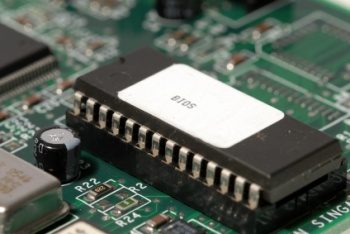
We all know how long it takes for our computer to boot up. Usually we run and grab ourselves a cup of coffee or a snack, or do some other little task while we are waiting. It can feel like an eternity. “Electronics is not supposed to warm up anymore,” says Brian Richardson, senior technical marketing engineer, for American Megatrends Inc., a major BIOS maker. “So we have been trying to shrink the time it takes to get the machine ready.”
BIOS is the program designed to get a PC started after power-on. It also manages data flow between the computer’s operating system and the attached devices such as your keyboard and mouse. When BIOS starts up, it determines whether all of the attachments are in place and operational, then it loads the operating system into the computer’s memory.
This process can be time consuming, but for consumers, computers have become such a part of daily life that they expect instant response from them just as they would their TV, cell phone, or other appliances.
“The BIOS is doing a lot more than waking up the machine and handing it a cup of coffee in the morning,” says Richardson. “It provides a layer so you can buy a PC take it home, wipe the configuration clean, change it and do it 100 times a day and your OS will still start up.”
The fact simply is that hardware checks take time. BIOS makers hope to shorten boot-up time so it doesn’t have to perform all the checks every time the computer is powered on, therefore running fewer initializations when it boots up.
PC makers hope is in the new standard called Unified Extensible Firmware Interface. UEFI is a specification detailing an interface that helps turn over control of the system for pre-boot to an operating system, such as Windows or Linux. Basically, the operating system will be doing work that the BIOS traditionally has done.
The process for booting up is twofold; the BIOS loads, and the operating system loads. Typically this takes anywhere from a minute up to three minutes, but again, to users it feels as though it’s taking forever.
Phoenix Technologies, one of the largest BIOS makers, has announced that their latest version of its BIOS could boot in about a second by cutting out some checks. Of course, you still have to wait for Windows to start up, but Microsoft claims that the new Windows 7 starts up in about 20 seconds compared to Vista which takes 50 seconds.
Phoenix and American Megatrends Inc, another major BIOS marketer, claim there are a few machines that already have BIOS based on the UEFI standard for quicker boot, although it will be late next year before this is incorported into the majority of models. And, UEFI will not be specific to any processor architecture.
However, there are a few ways to get quicker boot time right now.
“People assume they get instant on with the cell phones but no one reboots their cell phone every day,” says Richardson. “So one form of instant is never to turn it off.”
Almost all computers today have a sleep mode, a power-saving state that saves all open documents and programs yet allows the computer to resume full-power operation quickly. It’s sort of like pausing your DVD player. The computer stops what it’s doing and is ready again within seconds when you want to resume working.
Nathan Brookwood, a research fellow at market research and consulting company Insight 64, advocates staying away from the power button as much as possible. “Most systems today have the ability to go to sleep as opposed to being turned off,” says Brookwood. “Too many users don’t understand that.”
Sources: http://www.wired.com/gadgetlab/2009/10/quick-boot/ , www.uefi.org



